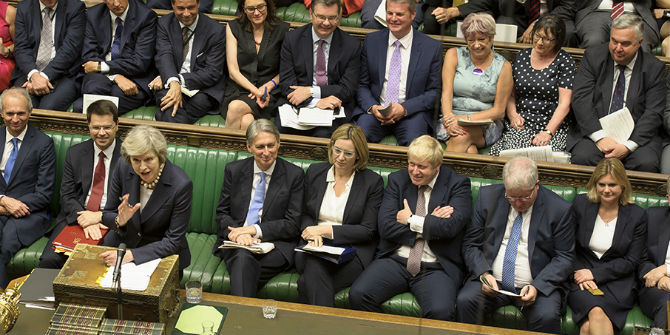 Depending on their design, referendums can be bad for democracy, writes Joseph Lacey (Oxford University). He argues that the central problem with the Brexit referendum was its ad hoc nature. Any second referendum would be of a similar sort and so should be avoided. But there is a way of legitimately deciding upon questions of EU membership: through the mandatory referendum.
Depending on their design, referendums can be bad for democracy, writes Joseph Lacey (Oxford University). He argues that the central problem with the Brexit referendum was its ad hoc nature. Any second referendum would be of a similar sort and so should be avoided. But there is a way of legitimately deciding upon questions of EU membership: through the mandatory referendum.
A common complaint of those who voted to remain in the EU is that the referendum should have never happened. The UK is a representative democracy, they say, where Parliament is sovereign. How on earth can such a complex issue as membership of the EU be decided by the people in an informed and balanced way? Don’t we elect representatives in order to make these complex decisions for us?
By contrast, referendums to join the EU have become the new norm, with ten of the last eleven member states to join have done so following referendums. The rationale is simple: becoming part of the EU is a decision so momentous that it requires the direct legitimation of the people. For similar reasons, it would be difficult to justify in principle, or imagine in practice, a country leaving the EU without a referendum of some kind.

In fact, the very Remainers who decried the 2016 referendum are unlikely to have resisted the demand for a referendum if the decision to leave the EU was taken solely by parliamentary fiat. No more evidence for this hypothetical is required than the planned legal challenge to the government recently proposed by the anti-Brexit pressure group Best for Britain. Their case is that the 2011 European Act, passed by Parliament, requires a referendum on any withdrawal agreement between the UK and the EU because such a deal would necessarily involve transferring competences to the EU during any transition period. The democratic argument motivating their legal challenge, however, is that such a major decision should not be made without the direct consent of the people.
There may be good reasons to resist the use of referendums. But it is nevertheless difficult to contend with the democratic force of the rationale for referendums on EU membership issues. And, in any case, it seems that there are few circumstances in which citizens would settle for less in any EU country. It is therefore worth reflecting on the question of how withdrawal referendums from the EU should be designed, because neither the Brexit referendum nor any subsequent vote would be able to meet the basic conditions of a well-designed referendum.
The design problem of the UK’s EU referendum
The central design problem of the 2016 referendum was its ad hoc nature. Ad hoc referendums are those that are not legally required, but rather called at the will of political representatives. These are problematic because of the ease with which they can become tools to gain political advantage or relieve political pressure. In other words, ad hoc referendums are highly susceptible to being called for party political reasons, rather than the democratic rightfulness of consulting the people on an important issue. It is not difficult for citizens to pick up on such disingenuous motives. Meanwhile, those who stand to lose from the referendum are likely to view it as an illegitimate attempt to change the rules of the game – circumventing the normal parliamentary decision-making procedure for some secondary political end.
The Brexit referendum unfortunately took on a dynamic of precisely this kind. The promise of a referendum on EU membership was primarily an electoral gambit by David Cameron, who wanted to appease the Eurosceptical members of his Conservative Party and neutralise the electoral threat of UKIP. Precisely because of the transparent electoral opportunism motivating the referendum, and the failure of the government to articulate in advance what leaving the EU would mean in practice, the legitimacy of the vote was in doubt from the beginning, and vocally called into question by the losers – the 48% who voted to Remain.
The tragicomic nature of the UK-EU withdrawal negotiations is a direct result of the kind of political gambling made possible by the opportunity for ad hoc referendums. Essentially, the government is now faced with the task of implementing a decision which it did not support, and for which there was no plan in place. The meaning of “Brexit means Brexit” has had to be worked through after the fact.
What would have been a more sensible referendum design
We must remember that referendums are supposed to be a check on the power of our representatives, to stop them acting against our best interests. Referendums are not supposed to be tools in the hands of our representatives to be used for party political purposes. The mandatory referendum serves as the main alternative to ad hoc referendums. Rather than allowing the government or parliament to simply call a referendum at will, mandatory referendums legally stop the government from making some decision without the direct approval of the people through popular vote.
Let us imagine a mandatory referendum legally instituted for the question of withdrawal from the EU. On this scenario, the national parliament would be first required to pass legislation to access Article 50 of the Treaty on European Union on withdrawal from the EU. The government would then be legally prevented from putting this legislation into effect until it had been approved by a binding national referendum.
Not only would this be the most democratic arrangement by giving the people the final say over their EU membership, but it would also set out well in advance the decision-making procedure for these kinds of issues. In this way, all actors will be aware of the rules of the game before the question of withdrawal even arises. Because the proposed type of referendum is necessary, and therefore predictable, while serving as a check on the government’s power rather than as a tool for electoral manipulation, the result will be democratically legitimate and far more likely to be perceived as such. Importantly, to the extent that the government is required to register its intention to trigger Article 50 in advance of a referendum, one can presume that a rational plan of action for post-EU membership would be formulated from the beginning.
The aim of this proposal is not to make it impossible for states to leave the EU. Rather, the point is to ensure that it is possible for a state to exit the Union only when there is demonstrable congruence between the will of parliament (through its desire to trigger Article 50) and the will of citizens (through their popular vote). The lesson for EU member states here is to legally institute the mandatory referendum as the appropriate decision-making procedure for leaving the EU. As the future is unpredictable, this is worth doing even for those states where there is little or no public desire to withdraw from the EU.
The way forward for the UK
But what of the lessons for the UK, now that the deed has been done? If ad hoc referendums are prone to legitimacy crises, then the wisdom of holding a second Brexit referendum is highly questionable. Certainly, any attempt by Parliament to force another referendum would be delegitimised in the eyes of many who voted for Brexit. The perceived fairness of democratic procedures is crucial to ensuring that democracy can do its job of peacefully managing conflict. Just how far a tarnished second referendum could (peacefully) manage conflict is a high stakes gamble. This is not a question of a fair procedure being held hostage by the threat of violence. It is rather a question of how we can expect citizens to maintain trust in the fairness of democratic procedures that are uncertain.
On the other hand, it might be argued that a court decision ruling that the European Act does in fact require a referendum on the Brexit agreement would result in a mandatory rather than an ad hoc referendum. In one sense, this is true. But in another sense, if the intention of the European Act was to provide for mandatory referendums pertaining to issues of withdrawal, such as the need for a withdrawal agreement, then the clarification of the court would be hardly required. Any decision by the court in favour of a referendum on the withdrawal agreement, where the option to remain in the EU was tabled, would be met with no less virulence by Brexit supporters than if it was proposed by Parliament. The only choice in a subsequent referendum that would be acceptable to many citizens is that between what the UK and EU actually agree in the withdrawal agreement and no deal whatsoever.
From the perspective of attempting to peacefully manage conflict, if the Brexit vote is to be reversed or mitigated in some way (e.g. by remaining in the Customs Union), then it is best done by political representatives. The justificatory force of representative politics has a much higher chance of success in this regard than the wilful force of yet another vote.
The above is partly based on arguments developed in the author’s article published in the European Law Journal. It originally appeared at LSE British Politics and Policy.
Joseph Lacey is Junior Research Fellow in Politics at the University of Oxford. His recent book, Centripetal Democracy: Democratic Legitimacy and Political Identity in Belgium, Switzerland and the European Union (2017, Oxford University Press), explores questions of democracy and identity in multi-level political systems.







“Any decision by the court in favour of a referendum on the withdrawal agreement, where the option to remain in the EU was tabled, would be met with no less virulence by Brexit supporters than if it was proposed by Parliament. The only choice in a subsequent referendum that would be acceptable to many citizens is that between what the UK and EU actually agree in the withdrawal agreement and no deal whatsoever.”
Overall a good and interesting expansion on a point of great import in our current political situation let down only by the statement quoted above.
I don’t believe that the failure of the ad hoc referendum to settle a very complicated action (leaving the EU) would be settled by a mandated referendum that did not give the the option of remaining. A referendum that only gave the choice of leaving under the government’s negotiated deal or leaving with no deal would not settle the issue, and would, in fact, exacerbate the problem. The author’s reason for not including the remain option is that it would be met by virulence by Brexit supporters. Surely, “the severity or harmfulness of a disease or poison” the dictionary definition of virulence, is what we are experiencing now, how could it be worse if the electorate could be given the chance to cure it.
It would not cure it. It would damage faith in our democratic process. Whatever your leaning, people voted in good faith and were the result of that vote abandoned before it ha the chance to be implemented, it would destroy people’s trust for all votes and for many years. The other, perhaps more worrying thing is that if people feel that their votes are utterly meaningless and that there is absolutely no point in voting, how will these people make their voices heard?